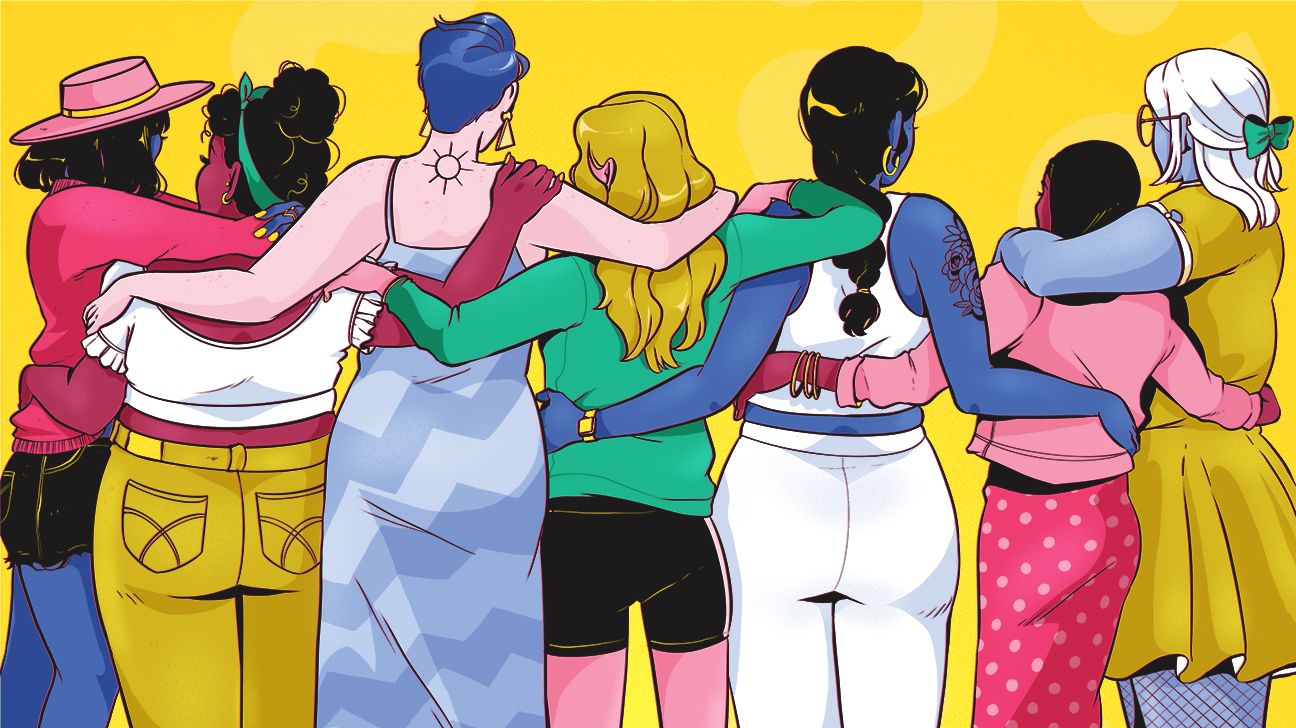My six closest friends and I now keep in contact through a video chat app called Marco Polo. We use the sh*t out of this app. The day I wrote this, we sent a total of 31 videos, many of them 5 or 6 minutes long.
We record messages first thing in the morning from bed, from behind masks while at the park, in our cars, and in the bath. We chat about new vibrator purchases, postpartum depression, skincare recs, deaths in the family, and tips on making curry. Most of us have cried in a video at some point.
But if you were to binge-watch the hours of footage, you might notice one subject is notably absent: We simply don’t partake in the common, brutal form of female bonding that is degrading our own bodies.

At no point will you find mention of “the quarantine 15.” The only mention of weight I can recall is when the only mother in the group told us she had gained 10 pounds since giving birth.
We’ve been friends for a decade now (we met on a study abroad trip in college), but it wasn’t until Marco Polo centralized our group communication that I realized we adhere to this unspoken agreement.
When I raised this in the group recently, I learned they’d all noticed it too. Most of them admitted that it was a unique feature of the group, that their other girlfriend squads weren’t like this.
As a woman, you learn pretty early on that an acceptable way to make friends with another woman is to insult your own appearance. When you use the bathroom at work, there’s a good chance you’ll encounter a co-worker who will say something like, “Ugh, my skin looks awful today” while squinting into the mirror.
If you’re anywhere near cake, you can guarantee a woman will appear by your side and say, “Oh, I really shouldn’t” while rolling her eyes deviantly at you.
I don’t mean to pile on women who do this or act like I’m not guilty of the same. This is simply one of the ways we’ve been conditioned to perform our femaleness.
When I was in middle school, a girl on our basketball team once started a competition to see who could go the longest without eating anything. Mind you, this was while we were sprinting for hours every day at practice. Some of the girls actually managed to go without food for multiple days. We were 12 years old.
Until my early 20s, I kept a tally in my head of the food I’d eaten every day. If I surpassed what I’d determined as “too much,” I berated myself. If I was “good,” I felt accomplished. Even though I didn’t have any evidence to believe I would gain weight, the fact that I was trying to achieve thinness meant I was somehow more worthy of my womanhood.
Today, those thoughts aren’t totally gone, but they’re much more under control. I admit it’s surprising since I didn’t do anything to make that happen. I’ve often wondered how the fixation could dissolve on its own. And then, recently, I made a new friend and learned how.
The new friend was my roommate’s girlfriend, and during the early days of the pandemic, she was one of the few people I hung out with. She had lost her job and I had started working from home, so we saw each other most days.
She and I occupied different cultural spheres, and I admit I don’t think we’d ever be friends in “normal” times. But we got along great. We were both loud talkers, we both liked to cook, and we both liked being outdoors.
It didn’t take me long to notice how much she talked about her body. She had a fixation on eating “healthy,” called herself fat all the time, and refused to eat food with certain ingredients. As an editor in the health space, I recognized the red flags in her habits. And as a woman, I saw a familiarity in her behavior — like hearing an old song from my past.
This friend is irresistibly charismatic and moves through the world with an ease I’ve always lacked. Being around her felt like being friends with one of the popular kids. I wanted some of her shine to rub off on me.
But about a month into our friendship, I realized the main thing rubbing off on me was her obsession with body image. After years of eating without thinking and exercising to feel good (rather than to lose weight), I was all of a sudden hyper-focused on food. I started taking videos of myself so I could see different angles of my body. Once again, my happiness started to be dictated by whether I was being “good” or not.
And then I had my “aha” moment. The reason I’d spent the last 5 or 6 years feeling so little negativity toward my body was because of this friend culture of prioritizing other topics over body issues.
I’m not saying the seven of us never have negative thoughts about our bodies, but I want to bring attention to the power of words and the power of friends.
We’ve all been warned that our friends will end up defining us. And, as with a lot of the advice I’ve been given, I never fully grasped how real that sh*t is until now.
What I’m saying is: Find friends that make you feel whole. Demand it. Because when it comes to choosing your inner circle, the stakes are really quite high. Your friends just might be the weight that tips the scale in the direction of self-love.
Ginger Wojcik is an assistant editor at Greatist. Follow more of her work on Medium or on Twitter.
